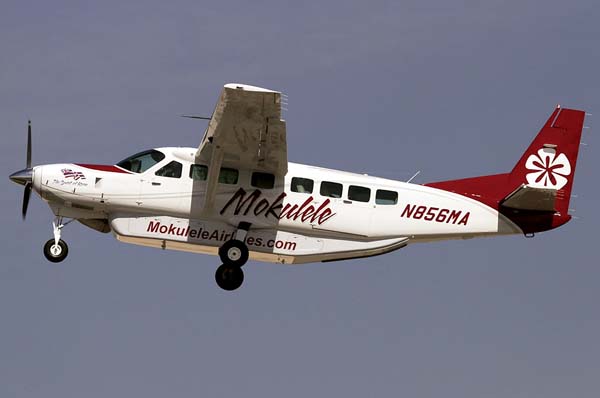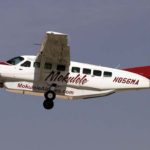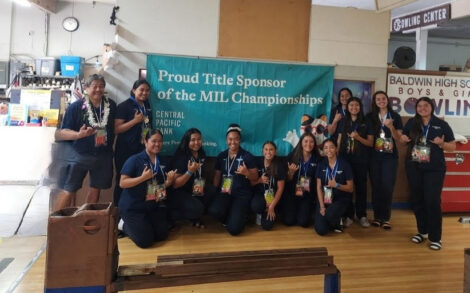Mokulele Airlines picked to serve Kalaupapa
No subsidy leaves some skeptical, raises concerns of costly airfares

On Friday, the U.S. Department of Transportation issued an order selecting Mokulele Airlines to provide Essential Air Service to Kalaupapa. The federal program ensures air service for hard-to-reach communities, often with a subsidy. However, if an airline applies to provide service without a subsidy, the federal government typically selects that airline. -- Mokulele Airlines photo
Mokulele Airlines has been chosen to service Kalaupapa without a subsidy, putting residents who fear sky-high ticket prices on edge.
However, Mokulele President Rob McKinney assured residents that rates would stay affordable.
“We know there’s apprehension whenever there’s change like this, but we are committed to making sure we take good care of that community,” McKinney said Monday.
On March 16, the U.S. Department of Transportation issued an order selecting Mokulele Airlines to provide Essential Air Service to Kalaupapa. The federal program ensures air service for hard-to-reach communities, often with a subsidy. However, if an airline applies to provide service without a subsidy, the federal government typically selects that airline.
That concerned patients and workers, who remember when Pacific Wings serviced Kalaupapa without government assistance, and ended up charging $500 for a round-trip ticket between Kalaupapa and Honolulu. McKinney is the former vice president of Pacific Wings, though he said the company raised rates long after he left in 2005.
“I know everyone was worried there was going to be a repeat of the past,” McKinney said. “I looked at everyone and committed that that would never happen.”
He said that while Mokulele is still working out its rates, “what we have committed to is the remaining patients will never pay more than $39 one way for the rest of their lives so long as Mokulele serves there.”
As for the 40 National Park Service employees and the 29 state Department of Health workers, Mokulele has “committed to never go above $95 for one way between Kalaupapa and Honolulu. We’re expecting the average fare to come in far below that.”
Mokulele is required to do two round-trips per day, six days a week, between Kalaupapa and Honolulu. McKinney said the airline will start with seven days “to see if that’s economically viable.” The airline will also offer at least six to eight round trips a week between Kalaupapa and topside Molokai.
Morning flights will travel from Honolulu to topside Molokai and down to Kalaupapa, then fly directly to Honolulu. In the afternoon, the routes will be reversed — the flight from Honolulu will go directly to Kalaupapa, then to topside and back to Honolulu. If flights fill up, Mokulele might consider adding more trips in the future, McKinney said.
The airline will start flying to Kalaupapa once Makani Kai Air’s contract expires on May 31. Makani Kai, which has been servicing Kalaupapa since 2011, reapplied for the contract along with Mokulele and Servant Air.
In January, 110 people, including residents, clergy and state and federal workers, signed a letter of concern over Mokulele’s proposal. They said Mokulele’s limited schedule would impact patients flying to Honolulu for medical appointments and staff flying in to Kalaupapa. They also said they’ve appreciated Makani Kai’s affordable rates, lack of fees for coolers and boxes and assistance for wheelchair-bound passengers.
Clarence “Boogie” Kahilihiwa, president of Ka ‘Ohana O Kalaupapa’s board of directors, urged the department to consider the example of former federal Transportation Secretary Ray LaHood, who chose Makani Kai over an airline that offered unsubsidized service and charged exorbitant rates.
“Secretary LaHood realized that while the unsubsidized airline provided a savings to the federal government, a high price was being paid by our community, families and friends,” Kahilihiwa wrote on March 8.
Makani Kai President Richard Schuman was skeptical of Mokulele’s ability to keep rates down without a subsidy, though he said it’s not because McKinney is a former Pacific Wings executive.
“I think it’s just ironic, but no. The reason I believe they cannot keep their prices affordable is because they’re not going to have the ridership they think they’re going to have, and they’re not going to have the community support, which they think they might get,” Schuman said Monday.
Makani Kai currently receives a $690,463 annual subsidy to fly 12 nonstop round trips per week to Honolulu and 18 nonstop round trips a week to topside Molokai. Schuman said that’s allowed him to keep prices the same for six years and not charge bag fees. He doesn’t think Mokulele will be able to do the same without federal aid.
“It’s very costly to operate, and the ridership between Kalaupapa and Honolulu, I average two people (per flight),” Schuman said. “So unless you’re going to make those two people pay you somewhere around $300, $400 each, it’s going to be a loss run.”
McKinney said the airline plans to offer residents and workers free membership in its Corporate Alii Plus Program, which allows for two free bags per flight. He added that Mokulele will have its own terminal in Honolulu starting in May and will be able to operate “exactly the same way they’re being transported now.”
In December, the department chose Mokulele to service Hana under the Essential Air Service program. Mokulele had been flying to Hana through to a cost-sharing program with local businesses. However, after that agreement ended, Mokulele decided to seek a subsidy to keep flights going.
When asked why Mokulele decided to offer unsubsidized service to Kalaupapa, McKinney said that “the traffic numbers are far higher for Kalaupapa than they are for Hana.” And, the annual subsidy of $114,099 that Mokulele receives for Hana was “very small” and mostly needed to “close the gap.”
“We believe that because we already have so much presence between Honolulu and Molokai anyway that we can add this service without needing the subsidy,” he said.
Because Mokulele isn’t getting a subsidy, there’s “essentially no contract,” McKinney said. Unless Mokulele tells the department that it plans to leave Kalaupapa, “then we’re there indefinitely.” When asked whether that could lead to a Mokulele monopoly, McKinney said it doesn’t because other airlines can still fly to Kalaupapa.
“If we start behaving in a manner that is inconsistent with what the community needs, somebody else can come in,” he said.
Schuman said it was too early to say whether Makani Kai would continue service to Kalaupapa.
The state Department of Health said in a statement Wednesday that staff had met with Mokulele and were “cautiously optimistic about assurances the airline will accommodate the distinct needs of the residents of Kalaupapa with accessible and affordable air transportation.”
“The health and well-being of our Kalaupapa residents and employees is our highest priority, and the community has justifiable concerns over the uncertainties of dealing with a new carrier,” the department said. “DOH will continue to advocate for the residents of Kalaupapa who deserve a level of air service that will meet their special circumstances.”
The situation caught the attention of U.S. Sen. Mazie Hirono of Hawaii, who met with Derek Kan, undersecretary of transportation for policy, before Mokulele was chosen. Per their conversation, the Department of Transportation “will provide a direct line of communication for input from the Kalaupapa community on any material changes of service” and “closely monitor the quality of air service,” Hirono wrote in a Feb. 26 letter.
“I will hold USDOT accountable to make sure air service to Kalaupapa meets the needs of the community,” Hirono said in a statement Friday.
* Colleen Uechi can be reached at cuechi@mauinews.com.
- On Friday, the U.S. Department of Transportation issued an order selecting Mokulele Airlines to provide Essential Air Service to Kalaupapa. The federal program ensures air service for hard-to-reach communities, often with a subsidy. However, if an airline applies to provide service without a subsidy, the federal government typically selects that airline. — Mokulele Airlines photo




